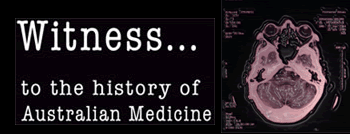


Tobacco Control: Australia's Role
Transcript of Witness Seminar
Introduction
Building the case for tobacco control
Producing, and Responding to, the Evidence
Campaigning for Tobacco Control
Economic Initiatives in Tobacco Control
The Radical Wing of Tobacco Control
Revolutionary Road
Tobacco Industry Strategies and Responses to Them
Campaign Evaluation
Managing Difficulties in Light of Community Consensus
Radical Wing Again
The Process of Political Change
Tobacco Campaigns Up Close
A Speedier Pace of Change
Political Needs and Campaign Strategies
Litigation and its Impacts
Insights from Tobacco Control
Tobacco Control in Australia in International Perspective
Appendix 1: Statement by Anne Jones
Endnotes
Index
Search
Help
Contact us

Tom Roper: John (Cain) said a lot of companies started to change their attitudes in terms of their workforces. So that quite a number of major companies that normally wouldnít support any Ďradical actioní started to say to their staff, ĎNo, you canít actually smoke in the building.í
We saw that, must have been in the NAB building in Bourke St. I had a group of Japanese coming to see me in my office there and they expressed their concern about the prostitutes, because all the young women had to leave their offices to go down and have a smoke outside. We explained that they werenít prostitutes, they were smokers. (Laughter) But a lot of companies and employers started to take an attitude, which again reinforced the kind of thing weíve talked about.
Also, another thing, people tend to forget that health ministers talk to each other. So Laurie Brereton[112] was my counterpart and friend in NSW. Weíd often talk about who we were going to take on and compare notes and compare tactics. And one of our big aims, of course, when we were health ministers, was trying to get Neal Blewett[113] to carry out the promises he made.
Thereís a lot of that kind of discussion that actually goes on. And there used to be very good meetings of health ministers and various other groups of ministers where policy was pushed forward quite strongly.
Todd Harper:[114] The other thing that fascinates me about the process of political change and the leadership that governments have shown - when you think about the success that tobaccoís had and yet its controversial nature; the Ď87 Tobacco Act is one, the plain packaging federal legislation is another - yet, Iím struggling to think of any substantive reforms over that period when itís come down to a vote, that have actually been opposed.
Now I donít doubt for a minute that they were controversial, but thereís something unique about tobacco, I think, thatís been able to drag oppositions along as well. And then you think about other health and social issues such as alcohol and climate change, and then weíve seen those reforms walked back by a change of government and put those reforms at threat. But I canít think that has happened in tobacco control.
Dorothy Reading: It almost happened at the establishment of VicHealth. We didnít have the support of the Upper House in Victoria and, in particular, we didnít have the National Party.
We had this nice model for VicHealth and we had already been recruiting people onto the board and, in fact, the chair. And they were people you couldnít argue against.
So, in fact, Quit and the Anti-Cancer Council of Victoria organised a launch of VicHealth in anticipation of the debate in the House. So VicHealth didnít exist, the hypothecation hadnít happened and we announced the chair in a huge event at the Arts Centre.
We got into terrible trouble for it and we had to be made (to realise) this was terribly improper. But it had happened. The VicHealth logo had been done by Clemengers.[115] We launched it. It was on everything. That was a very important point about getting the leader of the National Party, Peter Ross-Edwards,[116] across the line because he would have been arguing against these people who were the impeccable leaders of the medical and science world who we announced were on the board.
So it almost didnít happen. And that was one particular point in Victoria at which a risk was taken by the Cancer Council, and the government had to pretend that it knew absolutely nothing about it. Iím just trying to remember whether government people came along to that launch in the ANZ Pavilion.
 |
Witness to the History of Australian Medicine |  |
© The University of Melbourne 2005-16
Published by eScholarship Research Centre, using the Web Academic Resource Publisher
http://witness.esrc.unimelb.edu.au/146.html